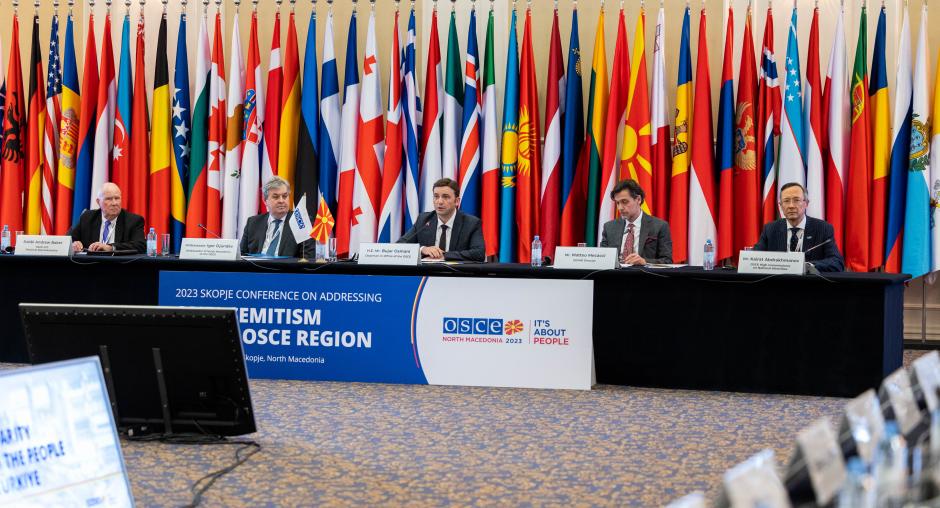Renewed efforts to counter anti-Semitism across the region are essential, say OSCE leaders

SKOPJE, 7 February 2023 – Taking stock of current efforts to counter anti-Semitism, an action that signifies further steps that need to be applied urgently, has been the central message of the participants of the of the 2023 Skopje Conference on Addressing anti-Semitism in the OSCE Region.
The conference marks the 20th anniversary of the adoption of the landmark 2003 Maastricht Ministerial Council Decision No. 4/03 on Tolerance and Non-discrimination. It focused on addressing anti-Semitic hate crime, identifying challenges and best practices to combat anti-Semitism through a regional perspective and with a focus on the role of youth, as well as the examination of emerging trends and areas of concern, particularly online.
The Chairman in Office, Minister of Foreign Affairs of North Macedonia Bujar Osmani opened the conference and raised many questions vital to addressing the current forms and manifestations of anti-Semitism.
“As we commemorate the memory of our own victims and all those who perished in the Holocaust, North Macedonia also has lessons learned and good practices to share. Hatred and intolerance cannot be fought with more hatred or intolerance, but only through active promotion of tolerance and non-discrimination, respect for human rights and fundamental freedoms; all this backed by the power of democracy and the rule of law,“ underlined Chairman-in-Office Osmani.
“The OSCE has since been at the international forefront in addressing anti-Semitism through a number of Ministerial Council Decisions. This year marks the 20th anniversary of the 2003 Maastricht Ministerial Council, decided to follow up the work started at the OSCE Conference on anti-Semitism in Vienna that summer. We can also all be proud of the cutting-edge tools and dedicated support programs developed and delivered by ODIHR, many of which North Macedonia and many other participating States have benefited greatly from,“ he added.
“While there has been much progress in the understanding of the importance of combating anti-Semitism over the last two decades, we continue to observe with great concern how anti-Semitic hatred, Holocaust denial and distortion and age-old disinformation about Jews continue to spread and multiply across the OSCE region,” stated the Director of the OSCE Office for Democratic Institutions and Human Rights (ODIHR) Matteo Mecacci. “To make a real difference, we need a commitment to dedicate resources to strengthen existing programmes, as well as an innovative approach from governments and civil society alike to tackling the roots of anti-Semitism.”
“In some places, the lessons of the Holocaust have been so universalized that its basic message—that left unchecked, anti-Semitism can in only a few short years lead to genocide—is entirely absent. Finally, the history of those darkest twelve years in the twentieth century must not be separated from learning about the centuries of Jewish life and its contributions to Europe that preceded the Holocaust and the revival of Jewish life in the decades that have followed it,“ stated Rabbi Andrew Baker, the Personal Representative of the Chairperson-in-Office on Combating Anti-Semitism.
Conference participants gathered to reflect on the progress made to address key areas in the common fight against anti-Semitism, such as countering anti-Semitic hate crime and ensuring the security of Jewish communities, addressing anti-Semitism in and through education, countering Holocaust denial, distortion and trivialization, and promoting Holocaust remembrance. Discussions at the conference also focused on the greatest challenges faced by Jewish communities across the region, including the rise of artificial intelligence and the proliferation of anti-Semitism online.
